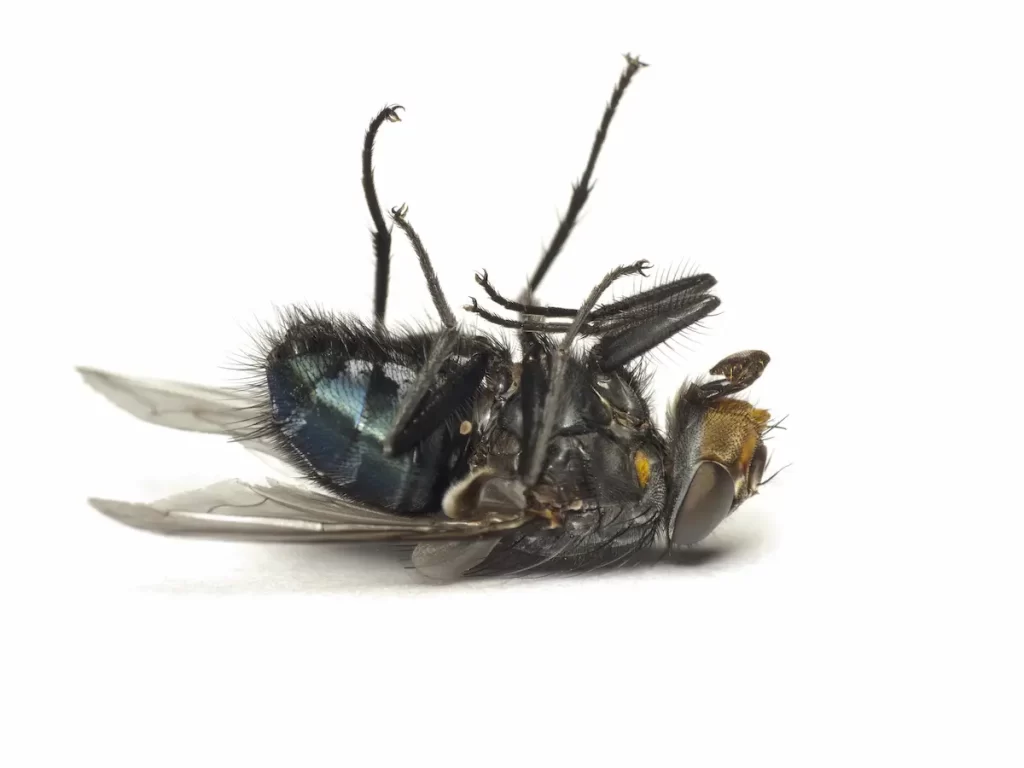Flies are detritivores, meaning that they feed upon the decomposing matter. Therefore, to keep your outside area free from flies, the most effective way is to limit the amount of decomposing matter in your garden including animal feces. There are also many varieties of fly repellents and traps that can be applied; however, one must be wary that none of the ingredients are toxic to dogs – essential oils for instance are quite poisonous to canines when undiluted.
Dogs. We love ‘em – so much so that despite the plethora of little creatures we have for some reason allowed to live in our home, dogs have risen above the rest to claim the title of ‘Man’s Best Friend’. Unfortunately, they are furry and smelly, both of which may attract flies into your home and garden. If you’re not willing to give up your fuzzy companion, what are the best ways to keep your yard fly-free?
So, the same principle which applies to the house also applies here; keep everything as clean as you can and make sure there is no decomposing waste around the place, but if you want some specifics, we can offer a few examples of how to keep flies out of your yard with dogs.

Related Reading: Do Patio Heaters Attract Bugs?
Clear The Garden of Waste That Attracts Flies
Let’s start with the simplest, yet most easily forgotten tip. All dog owners have been there at some point: it’s raining heavily, the dog hasn’t been for a walk yet and you just don’t have the strength to leave your couch and hot drink, so you let the puppy have a run about in the garden and whoops! He’s gone for a poo. But it’s raining so hard now – you’ll pick it up later when it’s drier. Then… You forget.
It is almost a rite of passage for a dog owner, but naturally, if your garden begins to fill up with little piles of poop, that is prime real estate for flies. Mostly, humans don’t tend to notice flies until they find their way into the house, but if you’re having a fly problem, try looking at the state of the outside. Just get a carrier bag and a scoop and get to picking that crap up. Remember, flies love any kind of decomposition, including:
- Dog Poo
- Sewage
- Rotting organic waste
- Decomposing plants
- General trash
- Any spilled sugar – whether food or drink
So alongside dog poop, clear your garden of any kind of waste they might like which is basically anything particularly stinky.
Treat Your Bins
Bins are a huge attractant for flies, with all that delicious rot they have inside them nearly constantly. One way to help prevent flies is to try and manage your trash properly; separating out different varieties of waste will make it easier to manage and is another boon to separating out the recycling. Organic rubbish should be your focus since they are the most attractive prospects to flies.
This is one of the few areas where a commercial pesticide may be appropriate to spray around since if you spray around the rim of a wheelie bin opening, it will work to help repel flies from landing in there in the first place, (preventing them from laying their eggs), whilst being out of reach of most fuzzy friends.
Carefully Use Some Essential Oils
Now, this is important: a lot of commercial fly repellents are pesticides that are very bad for your dog. Most people know this. There are commercial fly repellents that are so pet friendly that they can be sprayed on your dog, so if you want to pick a commercial fly repellent, be sure you know which one you’re picking up.
However, many sites will recommend homemade essential oil fly repellents, which can be quite effective, but an important note is any pure essential oil can be toxic to dogs. For most of these, the dosage and how long they are exposed to them are the main factors, but some of the nastiest ones for dogs are:
- Tea Tree
- Cinnamon
- Eucalyptus
- Pine
- Citrus, or d-limonene
- Wintergreen
- Pennyroyal
These ones are best avoided altogether, but if you want to use essential oils as a garden fly defense, make sure to use only 5 to 10 drops in your average spray bottle, diluting it with distilled water. Using this method, Lemongrass is thought to be one of the most effective fly repelling essential oils. Peppermint oil has also been thought to be effective, but make sure this one doesn’t get on your dog’s skin.
Coconut oil, however, is a natural fly repellent that is safe enough to put on your dog’s skin, and ingredients like garlic infusions, diluted citrus oils, and vinegar are also thought to be safe enough to use around dogs as fly repellents.
Wash All External Fabrics Frequently
Something that may surprise some is that whilst flies are very obviously attracted to and lay their eggs within smelly places like bins and piles of dog poo, they also make a habit of laying eggs within fabrics. A single female can lay up to 900 eggs – they can’t be too picky about where they end up placing them.
If your dog has an external bed, then make sure it gets a wash at least once a fortnight. If you have outside areas with fabrics on them, like patios with curtains or soft chairs, then make sure you treat them with pet-safe solutions for flies. If you have an external area that has any kind of carpeting and a problem with flies, then kick up the schedule of vacuuming; flies love to lay their eggs in carpets.
Grow Some Predation
Alongside essential oils, there are other natural ways to rid yourself of flies. If you have a few pots and green fingers, then there are some plants you can grow in order to rid yourself of flies. If you’re particularly adventurous in this regard, you might want to experiment with growing some Venus Flytraps.
These plants, whilst a tad difficult to grow, are famous fly killers and look awesome in a garden with their pretty pink leaves and spiked outsides. If you’re partial to fly-feeders as a natural solution to the problem, then you could also try your hand at lobster pots, monkey cups, and bladderworts.
Grow Some Fly Repellents
If growing some rooted predators is not so much your style, or perhaps too difficult to get the soil consistency right, then other plants you can grow may be able to help with your fly problem. Recommended plants are:
- Basil
- Lavender
- Chilli
- Catnip
All of these plants have scents that fly despise and avoid, and best of all, they’re all generally canine friendly! There could be issues if your fur-baby decided to eat large amounts of lavender or chili, but unless the chili is ridiculously hot or the pooch is chewing through an entire field of lavender, it won’t hurt them. Catnip is completely safe, and basil might even have some anti-arthritic and cancer prevention properties in dogs! The more you know.
Do a ‘Home Alone’ and Build Some Traps
There are many kinds of fly traps you could build which would be safe for a garden patrolled by a pooch – mostly because many of these traps should go above their heads. One of the more unusual traps is to use vodka. Fill a ziplock bag full with some of the cheaper stuff, partially close it, and hang it up high, perhaps on a tree or at a window. Flies hate the smell and will fly away from it, so place it in designated areas where you see flies often.
Another common trap to use includes only a plastic bottle and some bait; cut the narrow end of the bottle off and turn it upside-down. Place it back into the bottle, so it acts as a funnel down into the main body of the bottle. Many would fill the bottle with vinegar and sugar, or honey, but experiment until you have an attractive mix that attracts them well enough. Finish the inside of the funnel area with dish soap to make it slippery, and then secure the trap somewhere your four-legged friend won’t be likely to knock it over!
There are many different versions of both these traps, and not every trap will work for every house, so keep experimenting until you have a trap that works for you.
Conclusion
Dogs are wonderful, but they have elements about them as creatures that may attract flies. To combat this, you have a range of tools in your arsenal including dog-friendly commercial fly sprays, homemade solutions, plants you can grow to both eat and repel flies, and traps you can make at home which will help prevent and deal with fly infestations.
Aside from that, simply clearing your yard of debris and waste will work miracles in keeping flies away.
